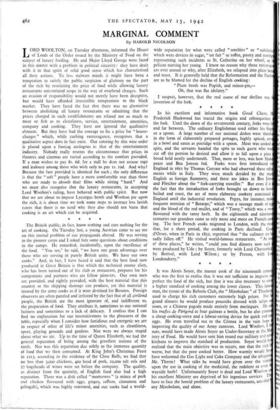The British public, in fact, know nothing and care nothing
for the art of cooking. On Tuesday last, a young Austrian came to see me on this eternal problem of our propaganda abroad. He was serving in the pioneer corps and I asked him some questions about conditions in the camps. He remarked, incidentally, upon the excellence of the food. " You see," he said, " we have one great advantage over those who are serving iri purely British units. We have our own cooks." And, in fact, I have heard it said that the best food now produced in Great Britain is that which the technical enemy alien, who has been turned out of his club or restaurant, prepares for his ' compatriots and partners who are fellow pioneers. Our own men are provided, and rightly provided, with the best material that this country or the shipping shortage can produce, yet this material is treated by the army cooks as if it were destined for Basutos. Foreign observers are often puzzled and irritated by the fact that of all civilised people, the British are the most ignorant of, and indifferent to, the preparation of food. They attribute it, sometimes to our national laziness and sometimes to a lack of delicacy. I confess that I can find no explanation for our insensitiveness to the pleasures of the table, especially when I consider how fastidious and energetic we are in respect of other of life's minor amenities, such as cleanliness, sport, playing grounds and gardens. Nor were we always stupid about what we ate. Up to the time of Queen Elizabeth, we had the general reputation of being among the greediest nations of the earth. Nor was this reputation due solely to the immense quantity of food that we then consumed. At King John's Christmas Feast in 5253, according to the evidence of the Close Rolls, we find that no less than 3,000 chickens, 420 head of pork, so,000 salt eels and 27 hogsheads of wines were set before the company. The quality, as distinct from the quantity, of English food also had a high reputation. There was a dish called " mortrewes " (a mince of pork and chicken flavoured with eggs, ginger, saffron, cinnamon and galingale), which was highly esteemed, and our cooks had a world-
wide reputation for what were called " sotelties " or " subtlef which were devices in sugar, " tot fait " or toffee, pastry and merin representing such incidents as St. Catherine on her wheel, or pelican nursing her young. I know no reason why these extrava ces ever ceased or why, after Elizabeth, we relapsed into plain boil and roast. It is generally held that the Reformation and the Puri are to be blamed for the decline of English cooking: "Plum broth was Popish, and mince-pie,- Oh, that was flat idolatry."
I suspect, however, that the real cause of our decline was invention of the fork.


























 Previous page
Previous page